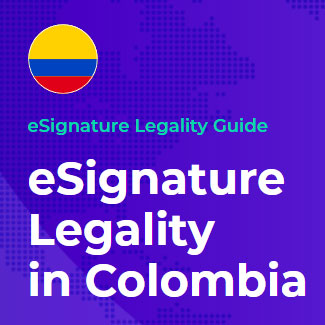Are Electronic Signatures Legal in Colombia?

Yes. Here’s what makes them legal, admissible, and enforceable.
A growing number of businesses around the world – ranging from banks and insurance companies to government agencies – are using electronic signatures to digitize their internal and external agreement processes. Although the benefits of electronic signatures have been known for years, the recent surge in remote work and limited access to in-person channels (i.e., branches) has accelerated e-signature adoption by businesses that have been slow to embrace the technology in the past.
Colombia was an early adopter of electronic signature technology. The country legally recognized e-signatures in 1999 as a method to capture intent electronically and create legally binding and enforceable agreements. Law 527 (“Legal and evidential validity of data messages”) sets the legal requirements and defines both electronic signatures and digital signatures as having the same legal effect as “wet” signatures. Digital signatures are referred to as a type of e-signature that requires each signer to sign documents with a digital certificate that is unique to him or her.
Electronic Signature Law in Colombia
While the law itself hasn’t changed during the coronavirus pandemic, “work from home” orders and physical distancing requirements have made wet ink signatures difficult to obtain. As a result, electronic signature adoption in Colombia continues to accelerate and is one of the key foundational technologies that is enabling Colombian businesses and governments to process digital transactions remotely.
Electronic signatures (including certificate-based digital signatures) are commonly used in business and commerce for agreement processes in Colombia. This ranges from B2E (business-to-enterprise) and B2B (business-to-business), to B2C (business-to-consumer) document-based processes. There are however a few circumstances in which an old-fashioned signature is still required. This includes notarizations and certain negotiable instruments such as bank checks, which require a physical (e.g., wet ink) signature.
What About the Use of Certificate-based Signatures in Colombia?
Under Colombian law, both electronic signatures and certificate-based digital signatures have the same enforceability as handwritten signatures. However, a digital signature is generally considered more secure, because it is supported by a digital certificate that is unique to an individual and has a higher level of identity assurance. That said, electronic signatures are widely adopted, and there are no documents stipulated in the law that require the use of personal digital certificates.
Organizations that opt to use certificate-based digital signatures should consult the Organismo Nacional de Acreditación de Colombia (ONAC), the Colombian crediting authority who publishes the Directorio de Acreditación, a list of local entities authorized to issue digital certificates in Colombia.
Key Considerations for Signing Electronic Documents in Colombia
Electronic signatures cover the full range of technologies that enable businesses to sign documents electronically, including workflow management, digital signatures, audit trails, identity verification, and electronic notarization.
Be sure your e-signature and digital signature provider:
- Is conscious about security and uses the latest cloud security and privacy measures to ensure your data is processed and stored safely;
- Offers one-click signature and document verification to ensure you know whether the e-signed document can be trusted;
- Provides multiple authentication approaches to identify and attribute the electronic signature to the signatory; and
- Supports a broad range of digital certificates that are unique to individuals and adhere to global standards (e.g., X.509 PKI).
OneSpan Sign is designed to meet the e-signature requirements in countries, like Colombia, that have enacted e-sign laws and regulations. Our solution can help your business comply with Law 527 as well as other e-signature regulations including the eIDAS regulation in the European Union (EU), the Electronic Signatures in Global and National Commerce Act (ESIGN), and other national laws. Your employees and customers can embrace simple, advanced, or qualified electronic signatures (QES) that are legally binding, admissible, and enforceable – both in Colombia and abroad.
To help organizations manage their compliance risk, we’ve developed on online e-signature legality guide in partnership with a multinational law firm to highlight select e-signature laws and regulations and clarify some of the common misconceptions about the legality of electronic signatures around the world.
For further information about the legal effectiveness of e-signatures and digital signatures in a given country, consult your legal counsel.
*DISCLAIMER: The information contained on this page is for information purposes only, provided as is as of the date of publication and should not be relied upon as legal advice or to determine how the law applies to your business or organization. It is recommended that you seek guidance from your legal counsel with regard to law applying specifically to your business or organization and how to ensure compliance. OneSpan does not accept liability for the contents of these materials or for third parties materials.









